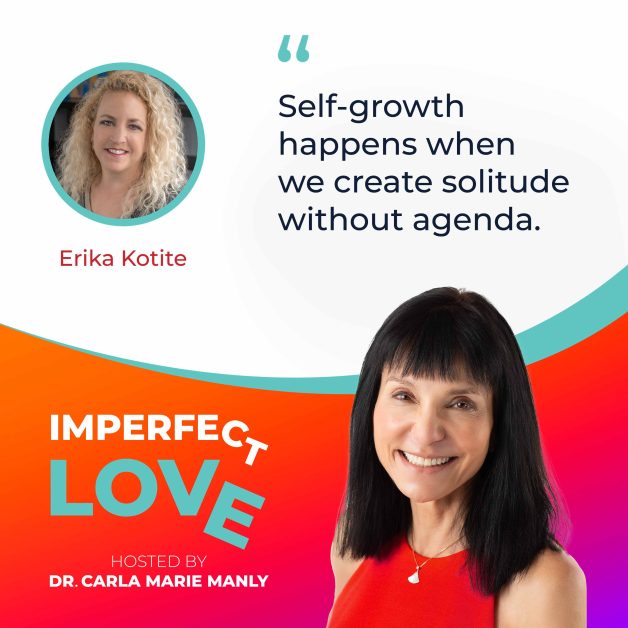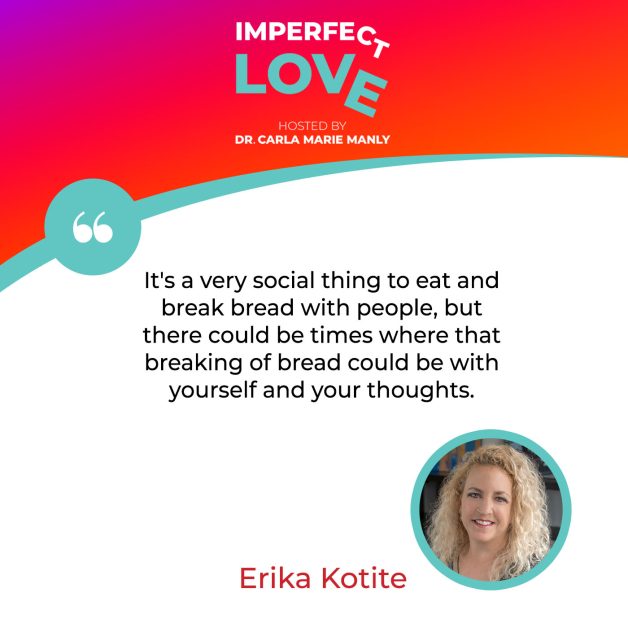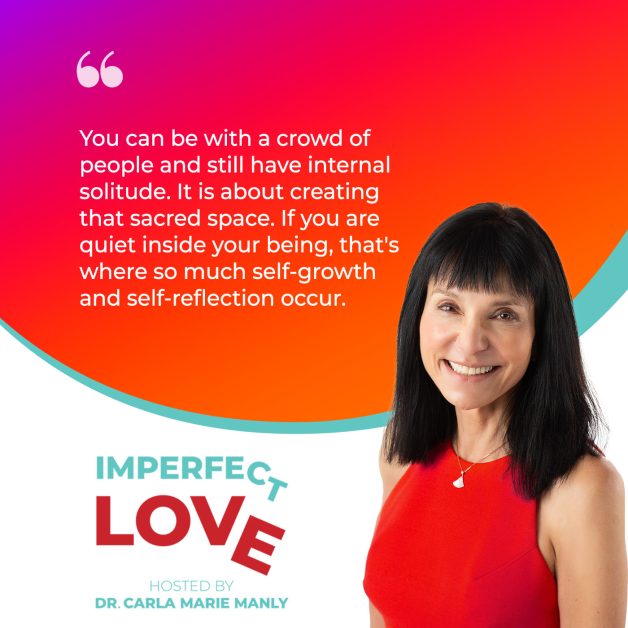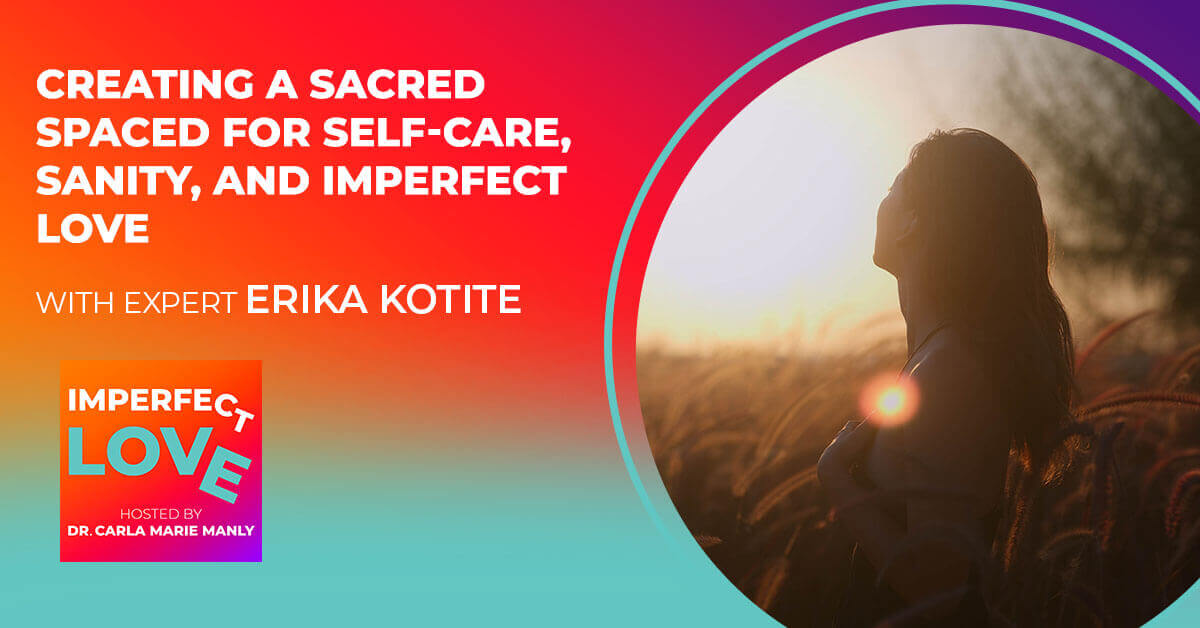Life isn’t perfect, and sometimes we get lost along the way–or never had the opportunity to find our authentic selves. This uplifting episode is devoted to helping you embrace simple strategies for reclaiming (or discovering for the first time) your amazing, true self. From giving yourself room for self-reflection to carving out a sacred spot for solo time, join Dr. Carla and Erika Kotite on the journey of making space for your best self to grow and radiate. After all, we can’t truly shine if we don’t know who we are.
Books by Dr. Carla Manly:
Joy from Fear: https://www.amazon.com/Joy-Fear-Carla-Marie-Manly/dp/1641701218
Date Smart: https://www.amazon.com/Date-Smart-Transform-Relationships-Fearlessly/dp/1641704675
Aging Joyfully: https://www.amazon.com/Aging-Joyfully-Optimal-Relationships-Fulfillment/dp/1641701412
The Joy of Imperfect Love: https://www.amazon.com/Joy-Imperfect-Love-Creating-Relationships/dp/1641709057
Oracle decks by Dr. Carla Manly:
Etsy: https://www.etsy.com/listing/1757477615/imperfect-love-reflection-oracle-cards
Amazon: https://www.amazon.com/Imperfect-Love-Reflection-Oracle-Cards/dp/B0D1Z5M4YK
Book by Erika Kotite:
Connect with Dr. Carla Manly:
Website: https://www.drcarlamanly.com
Instagram: https://www.instagram.com/drcarlamanly
Twitter: https://www.twitter.com/drcarlamanly
Facebook: https://www.facebook.com/drcarlamanly
LinkedIn: https://www.linkedin.com/in/carla-marie-manly-8682362b
YouTube: https://www.youtube.com/@dr.carlamariemanly8543
TikTok: https://www.tiktok.com/@dr_carla_manly
—
Watch the episode here
Listen to the podcast here
Creating a Sacred Space for Self-Care, Sanity, and Imperfect Love with Expert Erika Kotite
Creating Space to Grow and Shine
Life isn’t perfect and sometimes we get lost. If you are like me, you might have woken up one day realizing that you never had the opportunity to explore, much less get to know your true self. This episode is devoted to helping you find simple strategies for reclaiming or finding for the first time your amazing true self from creating internal room for self-discovery to carving out a sacred space for solo time. This episode is all about finding space to let your best self radiate. After all, we can’t truly shine if we don’t know who we are.
In this episode, I’m joined by a very special guest, Erika Kotite, who will be sharing with us her expertise in creating and using sacred spaces for self-care and overall wellness. She is an expert in her field and a role model for women and all genders in the art of creating room to learn, grow, and simply be. Erika, welcome to the show. I’m so excited to spend time with you. Before we get going on the meat of the show, tell me and the readers a little bit about what makes you you.
I am a California girl. I am a fifth generation. It’s in my blood and I am a writer. I am a reader of anything that is a novel. I love traveling and historic homes. I love the whole writing process and it’s been my career for many years. I also am a mother of three children all grown up and a wife to a wonderful husband.
I know you quite well. We’re old dear friends but I believe you also love Jane Austen among all those many other loves.
I was going to mention Jane Austen but I knew that was not the topic.

It’s funny because Jane Austen is one of the women that teaches us how important it is to know yourself and how it is not only normal and natural to get lost on the journey of life but how it is so important to reclaim yourself, find yourself, and stand in your truth. That’s pretty much the foundation of this show. Thank you for joining me and for shining some light on this important topic.
When you are looking, many times clients or readers say, “I’ve lost myself. I don’t who I’m anymore,” or people will write and say, “I followed this path. I’m on this career trajectory and I hate it. I did it to please my mother, my father, or whomever. I am hating life. I look in the mirror and I don’t recognize who I’m.”
As the creator of She Sheds: A Room Of Your Own, which to me is a book that’s very symbolic of the importance of having a sacred space for internal and external discovery, what would you say to this plethora of women and people of all genders who get lost and then wake up one day and say, “How can I create some space in my busy chaotic life to find out who I’m or reclaim who I was a long time ago?”
That’s a big one. In many people’s lives, it’s a lot easier to flow along with the people you love and the necessity of having a job, supporting yourself, pleasing your parents, and all of the social edicts that we all live by. They very easily consume more than their share of you as the self. Most of the time, it happens quite smoothly when you don’t even realize it. Unfortunately, it takes sometimes a negative epiphany, a trauma, a severe disappointment in life, or a great sadness that it sometimes takes something that big to point you to the fact that, “I don’t know myself. Who am I?” It brings you back to the existential questions.
For some people, it happens early on, luckily, in high school or college. Others might be retiring. Retiring is a huge life change that a lot of times women and men will sit down in their favorite chair and say, “I’ve got the whole day in front of me and I don’t even know what I like to do, whom I want to be with, or what makes me tick.” it’s quite interesting how it comes about in each life, at what age, and then what that person is going to do about it.
Find yourself! Love yourself! Create the space you need to bloom and grow! Join Dr. Carla and expert Erika Kotite for powerful, simple self-care steps that will help you find (and be) your best self! Share on XYou made me think about with retirement part. In my third book, Aging Joyfully, I talk about that part that often occurs when children leave the home and a woman or a man is there. It’s what we often refer to as the midlife crisis but it can happen anytime and you go, “Who am I? My kids are gone. What is my role in life? I’m no longer a mom, a worker bee, or this or that.”
I want to ask you a little bit more about you but before we go into that, what would you say are some important tips for all of the souls out there who reach that point, wherever it is in their lives, high school, college, 30, 40, 50, or 60? What are some ways that a person can create some space internally and externally to allow themselves to go through what is often that dark night of the soul of finding out, “Who am I?” It gives me shivers because I’ve been there. It is a dark laze to have to wake up one day, think you had it all figured out, and realize you have nothing figured out.
The first step is to look for that solitude in life. A lot of people think, “I have plenty of time. I have shower time and drive time. I have a lot of times when I’m alone.” The bottom line is most people consciously or unconsciously seek to surround themselves with people and tasks. They don’t have meaningful time alone to process, think, and reflect on where they’ve been and where they’re going.
My first tip would be to expand significantly your solitude. It doesn’t mean you have to be lonely. It usually means you should be alone. In those alone times, you don’t have an agenda. You are just absorbing who you are. You might be thinking about your past and contemplating your future. You need time with yourself.
I’ve asked a lot of people about going out to eat and whether or not they would go alone. Most people are horrified at the prospect of being in a restaurant with a table of wine. It’s funny because that’s the one thing I’m contrary about. I love going out to dinner by myself. Usually, I bring a book. I’m not saying it’s quality alone time. I’m saying that’s an example of something you could think about, “Why do I not like to dine alone?”
It’s a very social thing to eat and break bread with people but there could be times when that breaking of bread could be with yourself and thoughts. That’s one of many instances where you could weave in a significant amount of solitude to be with yourself without truly disrupting all the other patterns that you have in your life.

I don’t want to skip past this because it’s so critical. As you talk about solitude, I got chills. Tears came to my eyes. I could feel my heart getting full because it’s true. Many of us, me included, get very busy and forget to even cherish our morning walks. Often, if somebody wants to talk, there’s a podcast I want to listen to, or something is happening, I put my earbuds in and tend to do whatever that is.
I sometimes forget that that’s not alone time anymore. That’s a busy time. As you critically said, it is self-reflection. You can be with a crowd of people and still have internal solitude. It is about creating that sacred space. You can be walking around other people but if you are quiet inside your being, isn’t that where much self-growth and self-reflection occurs?

I have found in my work as a psychologist that many people run away from that quiet time because there’s such pain in there. There are so many emotions, unprocessed grief, loss, hopes, dreams relationship angst, and all sorts of things that come up when we’re quiet. Many people self-soothe with various things. What do you think about that piece? Sometimes, we misinterpret solitude. We make some quiet time and then all of a sudden, stuff starts percolating saying, “Listen to me. I don’t want to do that.”
It’s a gift that when you’re given it, it’s hard to appreciate the magnitude of it. We’re trained in some ways from our modern age and in some ways as human beings to look for distractions and entertainment. I was going to say something about reading and how meaningful that is for me. I have to say that reading is a different channel of self-discovery. It’s a different experience than it being utterly still and with yourself because your imagination is going somewhere else.
It has amazing benefits. I couldn’t tell someone, “Do your favorite Pinterest board or favorite Jane Austen novel. It’s still as good.” “I’m not sure it is.” There’s room for both of those things. The enormity of stillness and being in your space, whether physical, spiritual, or mental is very significant and rare in most people’s lives.
I like this piece before we move on to your next tip because for our readers, remember no matter what you have in your pocketbook or what’s in your bank account, this is something we can all access. We can access stillness by slowing down, finding time in the bathroom, bedroom, closet, backyard, or on a bus where we can turn inward, breathe, and be with ourselves. We don’t need money to find stillness, which is such a relief. There are many forms of self-care. It’s free. Thank you so much for that piece.
What is another tip? Before you say that, it also too depends upon what you’re reading. If you’re reading a self-help book, that’s not stillness but it is self-reflection. Not to say that Jane Austen’s books don’t make us self-reflect. Sometimes she has such words of wisdom. We can see ourselves in the character that we do. Sometimes it stimulates self-reflection. A Pinterest board, depending upon what you’re doing with it, can be maybe not self-growth work but it can certainly be healing work.
One thing you can do when you do finish a book, you can sit and think about, “Why do I love this book so much?” By answering those questions, whether it is self-help or fiction, it can reveal a lot. Sometimes things that you didn’t know or at least you never articulated about yourself could be a real moment of enlightenment to take that time, “Why do I love this much? What does that say about me?”
One thing you can do when you do finish a book is to ask yourself, “Why do I love this book so much?” Answering those questions can reveal a lot. Share on XI don’t know this about you and maybe you’ll know mine about me but what is 1 or 2 children’s book that spoke to you where you were like, “Why am I reading this over and over again?”
The children’s books that I remember as a child or I read to my children?
Whichever ones made you feel like you were looking in a mirror and there was some message for you.
The Giving Tree is one that I do not remember reading as a child. I don’t quite know when it was written but I did read it to my children and I love that book.
That makes me so happy. I have The Giving Tree stamps that someone gifted me because I love that book by Shel Silverstein.
It’s the message of a young boy going through joys and disappointments and this living thing, giving this little boy everything it had and they come full circle. I’m sure most of the readers read that book but if not, The Giving Tree is a jewel. As a child, the Little House books were probably some of the most meaningful books that I read and were read to me as a child.
I love the story of a pioneer girl who tries to be good and isn’t as good as her bigger sister. There are a lot of themes that Laura Ingalls Wilder introduced in her books. The physical descriptions that she had of 19th-century pioneer life are unparalleled. It made me love history and the country that I was born in. They gave me so many gifts.
The Little House talks about how she was dealing with imperfection. That’s its own episode. I do have a fun fact that I didn’t know about Shel Silverstein’s Giving Tree. Apparently, the book was a no-no in certain schools for this reason. The tree was seen as feminine that gave too much. That book was not allowed in certain schools for a while. There goes your mouth. It is an interesting take on the book because I didn’t see it that way myself. Fun fact but moving on, I can see both of those books.
The one I remember the most and tell a lot about me is The Princess And The Pea. I feel everything. No matter how many mattresses you give me, I feel everything. The other one was The Ugly Duckling because I always felt like the ugly duckling. Also, Are You My Mother? where the little bird is looking like, “Who are my parents? Where do I find my parents?”
Isn’t it funny that those early books can tell us so much sometimes, not only about who we were as children but how wise we were, how we were looking for role models, looking for answers to questions? Tying it back to the topic of this episode, I find that looking back at our favorite children’s books sometimes helps us see that we’ve always been searching. Sometimes we stop searching because we’re busy struggling with day-to-day life and how important it is to continue searching in that curious big way that we did when we were kids.
That’s one of the biggest gifts that new parents have. They have the opportunity to revisit not only their childhood books but to open their children’s eyes to new ones and see the ones that their children begged them to read over and over. It’s a great second chance for new parents.
You gave this great tip about solitude and the importance of self-reflection. What maybe 1 or 2 more simple tips that our readers can access for how can you start this journey of finding or reclaiming yourself? Solitude is fabulous. What would number two be?
Discover a new passion or pastime that lends itself to quiet time and solitude. One thing that does come to mind is gardening. Gardening is something that a lot of people think, “I can’t do that.” I like to call myself a gardener but I wouldn’t say that I would be. Most well-talented gardeners would not include me in their club but I enjoy the prospect of trying to plant something and hope that it lives for more than two weeks. There’s a joy that comes from going out and seeing the things that you’ve planted. It’s like, “That worked.”
Discover a new passion or a new pastime that lends itself to quiet time and solitude. Share on XI do understand when gardeners do talk about that joy they have going on in the backyard and a lot of people have something to it. I know not everybody has a backyard. Everybody has a place to put a pot. The joy of being able to snip off basil leaves for your dinner cannot be overstated. As far as how does that contribute to solitude, it’s an internal exercise. Maybe I’m not explaining it right but something about gardening or trying to raise living things almost forces you to look inward and be contemplative.
It’s not about us being master gardeners because we’re imperfect and it’s okay. That’s the lesson with gardening. Not only plants are forgiving but they’re also patient with us. I’m harvesting my basil. I do not have a big space to garden but it’s the time to watch the miracle of nature to contemplate how nature is forgiving and tolerant. It gives us such abundance, especially in spring, summer, and fall.
It teaches us gratitude but it also gives us a chance to put our hands in the soil. Whether we have a little pot and we’re watering houseplants or herbs on a kitchen counter, it invites us to witness the miracle of life. The imperfect is the fruit we grow at home. The little basil leaves are not perfect and we love them. We don’t compare them like, “This basil plant is better than that.” We go, “I’m so grateful for the basil.”
It is such a good mantra for us to remember when we’re looking in the mirror. “We don’t need to be that perfect piece of basil, tomato, or face. We can be grateful that we’re alive.” I don’t knit or things like that but I would imagine that also crafting, like doing a vision board on Pinterest or playing in the sand. Anything creative can help you, especially if your mind’s not busy doing other things. You don’t have that thing going in your head.
There are a lot of physical activities. Sewing is a great point with crafting. Even if you are a runner, there’s something about physical exercise or doing something physical that almost disengages your mind and allows you to have great thoughts. A lot of things that I remember very distinctly were thoughts that I had like, “I can’t run anymore because my knees don’t work as well.” When I did run, it created this enriched compartment in my imagination that I remember a lot of what I thought about while working out. A lot of people don’t like to garden, read, or work out. There are a lot of ways you can tune into yourself while you’re exerting yourself.
When you’re doing a physical exercise or just doing something physical, that almost disengages your mind and allows you to have great thoughts. Share on XMaybe even its third tip alone, the importance of exercise. No matter where you are physically, whether you’re lifting tiny weights in your living room, taking a hike, or going for a run, I know for me as a yoga instructor and constant yoga student, how important it is to notice. I had to create this mantra of, “Be here. Be loved,” because my mind tries to leave me. I’m on the yoga map practicing peace and meditation. My mind’s going, “I need to do this and that.” It’s the constant work of bringing it back to the moment where we can grow if we are present with the self-letting thoughts coming up. Let them go and notice that we don’t always have to be on the hamster wheel with the mind. Last final tip?
Here’s something that everybody can do. My background is in creating spaces in the backyard that are separate from the house for women and men to have great private space. If you think about where you go after a hectic workday with your family and kids, I almost guarantee there’s a little corner of your apartment, condo, or house that you have your stamp on. It could be a chair or even a little place on the carpet where two walls meet and there’s a pretty window that gives you great light. You already have a me-room where you live. You may not consider it a room but it is because that’s where you go. If somebody’s sitting there and you’re ready to use it, you’re like, “Get out of my space. That’s mine.” It’s not rude.
Most families are like, “That’s mom’s reading chair.” The cats will go on it but the people will know better like, “That’s where mom reads. Leave it alone.” Celebrate that little corner of your living space and recognize it as, “My sacred space. My she shed,” or whatever you want to call it. It’s amazing that when you’re there you get these imaginary walls in a good way to start enclosing you and making it private, a place where you can hear yourself think. Everybody has a dedicated space in their house. You should recognize it and be happy about it.
I love that so much, especially the part about being something as simple as a chair. It can be the place on the back deck, your front stoop, or the seat on the bus that’s always yours. There have been times in my life when my car was my sacred space. Finding a place, pulling over, and saying, “This car is my sacred space right here, right now.”
Have you noticed more people staying in their cars longer when they’re seeking out their parking spot? I’ve noticed an uptick and maybe it’s for catching up on texts but it’s other things too. It’s transitioning yourself from one spot to the next. It’s taking a little nap. I like the trend except when I want their parking space.
Now that you say it, I have. In our area, there’s quite a lot of homelessness. People are unfortunately having to resort to making their homes in a car and that is their safe space. I recommend that. It’s interesting with clients who have a difficult time transitioning from work to home that it’s okay to go leave work. It’s important to sit in your car, breathe, drive home, sit in your car, breathe, unpack, and leave your briefcase metaphorically in the car so that you can transition and go home and be present. I love that you said it can be as simple as a chair or a seat in a car because that opens up making a space of your own, which is so important.
It’s heartbreaking at times in life when we feel like we don’t have any place that’s our own. The TV, music, kids, or work is too loud. People are at our desks, this or that. Realize, we have the right to say, “Time out. I love you. I care about you but right now is me time. This is my sacred space.” If we’re blessed enough, maybe we have a garage, man cave, or a little she shed that doesn’t need to be expensive. I’ve seen some in your book that are like magically precious, all salvaged pieces. It’s gorgeous. We have that right whether it’s a physical space or a place where we want to be to say, “Please, I need this space for me to collect and restore.” You’re such a leader in this area and I’m so grateful for it.
I’m always looking for new ways to help people manifest that sense of aloneness. One of the things I was going to suggest is if it’s a corner of your small hall, like even a folding screen that’s very inexpensive, having that visibility block, even if it’s temporary, makes it huge. There are a lot of different ways you can do that with hanging plants. A lot of different streamers like a beaded curtain. There are a lot of cute things you can do to create your little room.
I want to give a nod back to childhood. When we do the little blankies over the chair or over the table to crawl under, we know the importance as children of having that quiet sacred space. We forget that often as we grow. We get too busy or old for it. There are times I want to put a blankie over a table, crawl underneath, and curl up or create a little port. Thank you so much for sharing your time with me. It’s such a blessing and joy. Where can our readers find you and see more about what you do?
I run a business called She Shed Living. The books I read led me to try to help women find their space, whether it’s inside their houses or a backyard structure. I run it with my partner Sabrina. It is a small woman-owned business here in Southern California. We have a website that has lots of cool resources that might help you fashion that a little, whether it’s a physical shed or a spiritual space of your own. We’ve got a lot to share there.
The website address is?
You’re on Instagram I imagine?
Anywhere else we should be looking for She Shed Living?
You’ll pretty much find us if you type in She Shed Living. We’ve got a great Pinterest page. We got all kinds of stuff. I hope we see you there.
Reader, if you’re like me, maybe you can look and dream about some of those She Sheds. Looking is sometimes truly cathartic. Thank you for sharing your time with me. You’re such a blessing. I look forward to seeing you again soon.
Thank you so much for having me.
Important Links
- Erika Kotite
- She Sheds: A Room Of Your Own
- Aging Joyfully
- The Giving Tree
- The Princess And The Pea
- The Ugly Duckling
- Are You My Mother?
- @SheShedLiving – Instagram
- Pinterest – She Shed Living
- https://www.Amazon.com/Date-Smart-Transform-Relationships-Fearlessly-eBook/dp/B08GFNC6WX
- https://www.Amazon.com/Joy-Fear-Create-Dreams-Making-eBook/dp/B07ZWXL1MF
About Erika Kotite
 Writer, editor, mom, sacred space expert, and co-founder of She Shed Living
Writer, editor, mom, sacred space expert, and co-founder of She Shed Living
